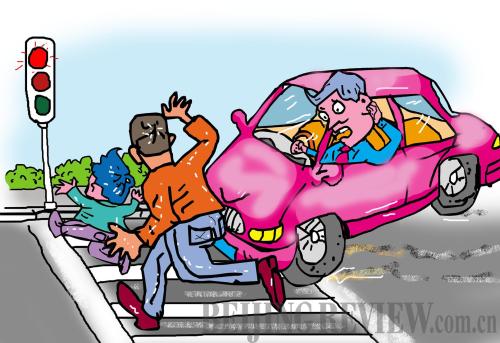|
 |
|
(LI SHIGONG) |
If pedestrians or bicyclists cross a busy street against traffic rules, they can be difficult for drivers to avoid. This situation often results in an accident. Who should be responsible?
In April 2009, two people in southwest China's Chongqing crossed a street forbidden to pedestrians to save time even though an overpass was within 100 meters. Unfortunately, Mr. Zhang, a drunken motorcycle driver, in trying to avoid them lost control of his vehicle, resulting in his death. His family went to court to request compensation of 100,000 yuan ($15,000) from the pedestrians. A local court later ruled the pedestrians had to pay 20,000 yuan ($3,000) apiece. The decedent's family attorney this January wrote to the National People's Congress, China's top legislature, suggesting that accidents caused by pedestrians crossing roads illegally should be the pedestrians' responsibility, and they should be convicted of endangering public safety.
This proposal has become controversial.
Proponents believe implementing the "pedestrian first" principle does not necessarily mean pedestrians who cross roads are not guilty or shouldn't take responsibility if they cause traffic accidents. In a society ruled by law, anyone who commits a crime should be convicted. The current Road Transportation Safety Law says blameless drivers should be liable for no more than 10 percent of the total compensation payment, but this stipulation is meant to strengthen protection for pedestrians—who are often exposed to greater safety risks and not to clear them of blame. So if a pedestrian causes an accident, he or she should be responsible under criminal law.
People against the lawyer's proposal say most victims in traffic accidents are pedestrians. There are few precedents where drivers are the victims or even suffer in a domino crash caused by a pedestrian. Investigations have shown, in most traffic accidents, drivers are exhausted, drunk, careless or speeding. Therefore, most of these accidents can be avoided. So, without effective methods to regulate drivers' behavior, it is not right to hold pedestrians involved in traffic accidents criminally responsible.
No excuse for law breakers
He Hongbing (hlj.rednet.cn): Compared to vehicles, pedestrians are the vulnerable ones. But that does not provide good reason for arbitrary street crossings. If pedestrians are not mentally disabled, they are of course clear about possible risks. If they knowingly break the law and cause casualties, there is no excuse for them to escape legal sanctions.
At the end of 2009, Chengdu Evening News (a publication in southwest China's Sichuan Province) began to recruit volunteers to dissuade rule-breaking pedestrians. This initiative was approved of by most local residents, and included drivers who had experienced these types of accidents. Sometimes, moral guidance may prove effective in rectifying malpractice in society, such as traffic offenses. But it is not enough. If we want to solve the problems completely, tough measures must be taken. Only the law can restrict the unscrupulous and stubborn.
Li Guohui (Daily News): Faced suddenly with pedestrians, vehicle drivers have little time to react. If arbitrary street crossings are sanctioned legally, there will be fewer people rushing across streets in the future.
Certainly, different people have different ways of thinking, but a perfect transport system is a major symbol of a highly developed society. To avoid a situation where "vehicles are mounting sidewalks and pedestrians have to cross highways," the two parties should cooperate more effectively. And obeying the law will make the traffic environment more smooth and orderly. For this purpose, legal punishment on rule-breaking pedestrians are necessary.
Yunshui Chanxin (cnhubei.com): In China, major casualties and losses caused by pedestrian violations are frequent. Of course, an increase in the number of private cars makes streets more crowded. But a major problem is that laws now only prescribe pedestrians' civil liabilities, not penal liabilities. This makes for more careless, even intentional rule-breaking by pedestrians...and major traffic accidents.
Also, laws in China are too favorable to pedestrians. So far, no matter whether or not a pedestrian killed in a traffic accident should be blamed, the families of the dead receive compensation. This inadvertently leads to ignorance of traffic laws because people think an accident must be the driver's fault. As a result, pedestrians run red lights or cross streets forbidden to them without hesitation, not even waiting for a few seconds.
Most people are fully aware that arbitrary pedestrian street crossings are very likely to cause heavy casualties. If they are still unwilling to restrict their behavior, it already constitutes a legal ingredient of the crime of endangering public safety in accordance with the Criminal Law. So making rule-breaking pedestrians criminally responsible for casualties and economic losses caused by their acts is a good way to raise pedestrians' consciousness of road safety and eliminate hidden risks.
Li Kejie (Yanzhao Metropolis Daily): I notice some people are trying to change the subject concerning rule-breaking pedestrians' legal liabilities into an argument about the gap between the poor and the rich, claiming that legal sanctions will shield the rich because the poor have to give way. This opinion is irrational and not in accordance with social reality. It also goes against the principle of equality before the law. Regardless of the fact that not all vehicle owners are rich, and not all vehicles flaunt wealth, the logic in such sayings is completely wrong. The poor and the vulnerable also break the law. Paradoxically, this kind of thinking does not protect pedestrians, but represents potential danger to them.
|
